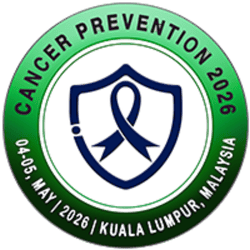Track: Cancer Epidemiology and Prevention

Cancer epidemiology and prevention play a crucial role in understanding the patterns, causes, and risk factors associated with cancer at the population level. This session focuses on how epidemiological studies inform evidence-based cancer prevention strategies, public health interventions, and early detection programs to reduce the global cancer burden. Participants will gain insights into the latest research on cancer risk reduction, cancer screening programs, healthcare innovations, and the integration of epidemiological data into global cancer initiatives. By fostering collaborations between researchers, clinicians, and policymakers, the session aims to strengthen preventive oncology efforts, improve healthcare research outcomes, and advance cancer awareness and education worldwide.
Role of Epidemiology in Cancer Prevention Strategies
Highlight how epidemiological research informs targeted cancer prevention strategies, guiding public health interventions, cancer screening programs, and evidence-based policies to lower cancer risk factors and improve healthcare outcomes.
Early Detection Programs and Cancer Screening Initiatives
Examine the design and effectiveness of large-scale cancer screening initiatives that enhance early detection, reduce cancer-related deaths, and promote equitable access to preventive oncology services across diverse populations worldwide.
Behavioral and Lifestyle Risk Factors in Cancer Development
Discuss how modifiable behavioral and lifestyle factors—such as smoking, diet, obesity, and physical inactivity—impact cancer risk, emphasizing the importance of public health interventions to encourage healthier lifestyle choices.
Cancer Awareness Campaigns and Public Health Education
Focus on the role of public awareness campaigns in increasing knowledge about cancer prevention, improving participation in cancer screening, and strengthening global cancer initiatives aimed at reducing cancer incidence.
Cancer Registries and Data-Driven Epidemiology
Examine the importance of robust cancer registries and data-collection systems in tracking cancer trends, improving healthcare research, guiding preventive oncology strategies, and enhancing resource allocation for cancer prevention programs.
Cancer Risk Reduction through Vaccination and Immunization
Discuss the effectiveness of cancer-preventive vaccines, such as HPV and hepatitis B vaccines, in reducing cancer incidence rates and improving preventive oncology initiatives for high-risk groups globally.
Scientific Highlights
- Public Health & Cancer Awareness
- Cancer Prevention
- Screening & Early Detection
- Vaccination & Immunoprevention
- Environmental & Occupational Factors
- Complementary & Emerging Approaches
- Genetic & Personalized Prevention
- Cancer Biology and Genetics
- Cancer Immunology
- Molecular Oncology
- Hematology in Cancer
- Cancer Diagnosis and Therapeutic Approaches
- Oncology Research and Innovations
- Advanced Methods in Cancer Research
- Cancer Epidemiology and Prevention
- Future Trends in Prevention & Research
- Pediatric Oncology


